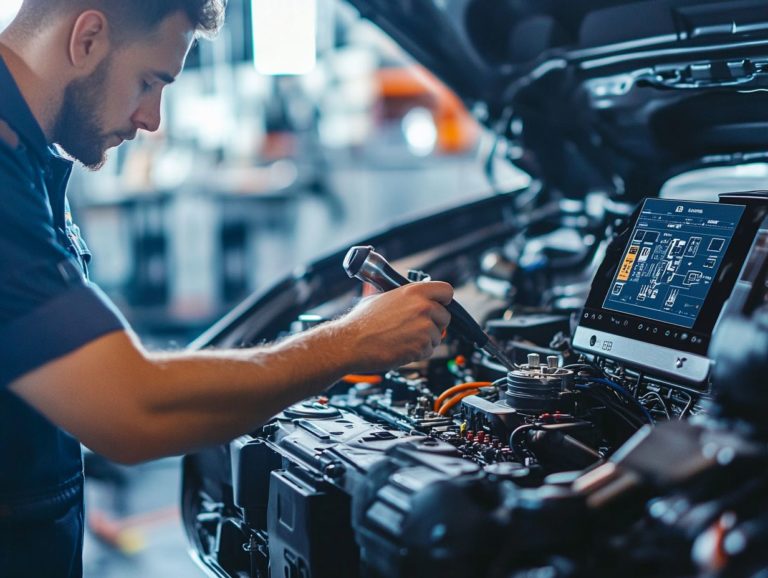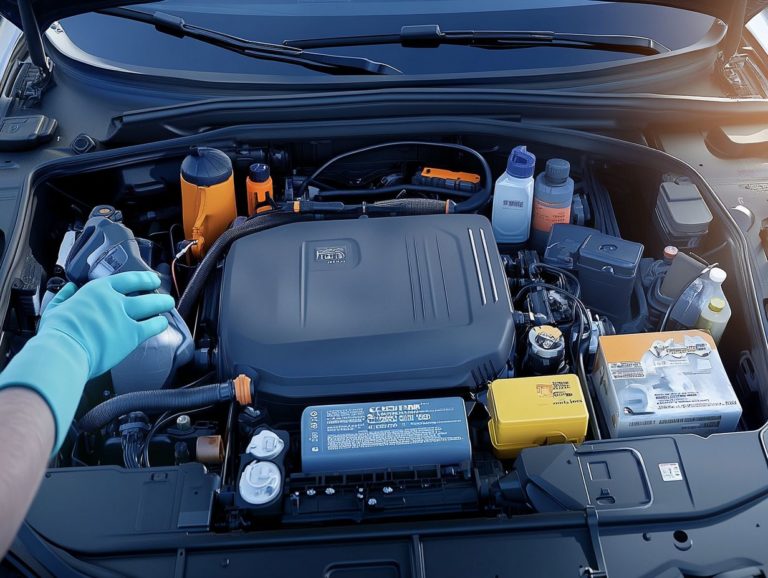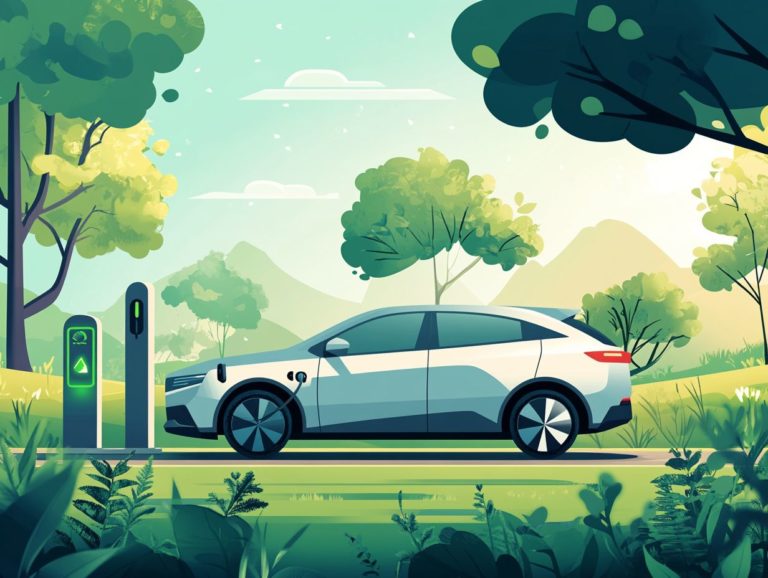5 Tips for Maintaining Your EV’s Battery
Want to make your electric vehicle battery last longer? You’re in the right place! Proper maintenance is vital for ensuring its longevity, performance, and efficiency.
From grasping the intricacies of how your battery operates to identifying the signs it may need a replacement, there’s much to contemplate.
This article delves into five essential tips for keeping your battery in peak condition, dispels common myths, and highlights the environmental advantages of diligent maintenance.
Keep reading to boost your EV experience!
Contents
- Key Takeaways:
- 1. Understand Your EV s Battery
- 2. Keep an Eye on How You Drive
- 3. Keep Your Battery Charged, But Not Overcharged
- 4. Avoid Extreme Temperatures
- 5. Regularly Maintain Your EV
- What Are the Common Myths About EV Batteries?
- Frequently Asked Questions
- What are the top 5 tips for maintaining your EV’s battery?
- Why is it important to monitor and maintain proper charging levels for your EV’s battery?
- How can I keep my EV’s battery cool to maintain its health?
- What is regenerative braking and how does it help maintain my EV’s battery?
- Can planning my routes and charging stops help maintain my EV’s battery?
- Do EVs require regular maintenance checks like traditional cars?
Key Takeaways:

- Understand your EV’s battery composition and charging capabilities to make informed maintenance decisions.
- Keep an eye on how you drive to optimize battery usage and prevent overcharging or draining.
- Keep your battery charged, but avoid overcharging, as it can harm the battery’s lifespan.
1. Understand Your EV s Battery
Understanding your electric vehicle s (EV) battery is essential for maximizing its performance, longevity, and efficiency in your daily driving. Typically a lithium-ion type, an EV battery plays a crucial role in determining its overall life and health.
Knowledge of battery chemistry and performance metrics gives you the power to make informed decisions about how you use and maintain your vehicle. Just look at the data from Geotab and models like the Nissan Leaf.
When you delve deeper into lithium-ion technology, you’ll uncover key aspects like energy density how much energy the battery can store in a small space charge cycles, and thermal management. These factors significantly influence how efficiently the battery operates under different conditions.
For instance, understanding metrics such as battery health and state of charge enables you to know precisely when your vehicle needs a charge or a maintenance check. By leveraging Geotab data, you gain insights into your charging patterns and energy consumption, allowing you to optimize your routes and charge times.
These small adjustments can greatly contribute to the longevity and performance reliability of your battery over time.
2. Keep an Eye on How You Drive
Keeping an eye on how you drive is crucial for enhancing energy consumption efficiency and extending the life of your electric vehicle’s battery. By identifying usage patterns, you can better understand what impacts battery performance and health.
Aggressive acceleration or unnecessary rapid charging can put significant strain on the battery, leading to faster wear over time. By adopting smoother driving techniques like gradual acceleration and gentle braking you can mitigate this impact and promote a healthier battery.
Your charging habits also matter; it’s wise to charge your vehicle at a leisurely pace during off-peak hours instead of relying on fast-charging options whenever possible. Additionally, following 5 tips for test driving an electric vehicle can enhance your overall experience. Implementing these strategies not only preserves the battery’s lifespan but also contributes to overall vehicle maintenance, ensuring your electric vehicle operates at peak performance while maintaining its efficiency.
3. Keep Your Battery Charged, But Not Overcharged
Maintaining the right balance in your electric vehicle’s battery charge is crucial. Keeping it charged without overdoing it can prevent battery wear and ensure you achieve the maximum range possible during your journeys. For further insights, check out these DIY maintenance tips for electric vehicles.
To achieve this, smart scheduling and optimizing your charging settings are essential. Consider planning your charging times around off-peak hours or when renewable energy sources are most available; both strategies contribute to healthier battery cycles.
It’s important to avoid consistently charging to 100%. Overcharging can lead to increased heat, which can ultimately harm your battery life. Instead, aim to keep your charge between 20% and 80% this range creates an optimal environment for longevity.
Regularly monitoring your battery health through the vehicle’s smart systems will also give you valuable insights into the best charging practices.
Start applying these tips today for a healthier, longer-lasting battery!
4. Avoid Extreme Temperatures

Avoiding extreme temperatures is essential for preserving your electric vehicle s battery chemistry and performance. Both hot and cold conditions can significantly affect battery health and longevity.
Temperature fluctuations can lead to rapid wear of the battery’s chemical compounds, ultimately diminishing its capacity and efficiency. In hot climates, overheating may cause the electrolyte to evaporate. In frigid conditions, the battery might struggle to hold a charge.
To counteract these effects, consider parking your vehicle in shaded or temperature-controlled environments. Use the system that controls battery temperature if your vehicle has one. Regular maintenance is also essential; check battery connections and ensure proper insulation.
Periodically servicing your vehicle in extreme climates can help you spot early signs of battery wear. This ensures optimal performance for the long haul.
5. Regularly Maintain Your EV
Regular maintenance of your electric vehicle is crucial not just for prolonging the life of the battery but also for optimizing the vehicle’s overall performance. To learn more about how to ensure your EV’s longevity, keep your EV running at its best by ensuring all parts work efficiently!
By routinely checking the battery’s state of charge and using specialized software tools to evaluate health metrics, you can uncover valuable insights into your vehicle’s efficiency. When you notice signs of wear, it’s wise to consult with a qualified technician to discuss whether battery repair or replacement might be necessary.
These practices, along with regular checks on tire pressure and brake systems, are vital for enhancing your overall driving experience. They help minimize unexpected breakdowns and extend your vehicle’s lifespan. Prioritize regular service now to avoid future headaches and ensure a smooth ride!
What Are the Common Myths About EV Batteries?
Despite the rising popularity of electric vehicles, a host of myths about EV batteries continues to circulate. These foster misconceptions about their performance, technology, and overall longevity particularly regarding the lithium-ion batteries commonly found in models like the Nissan Leaf and Tesla.
One prevalent belief is that EV batteries degrade quickly and lose their capacity within a couple of years. In reality, studies indicate that most modern lithium-ion batteries can retain over 70% of their charge even after a decade of use.
You might also assume that charging an electric vehicle takes an inconveniently long time; however, advancements in charging infrastructure have introduced rapid charging options that can replenish 80% of a battery s capacity in just 30 minutes, transforming the travel experience.
Concerns about fast charging damaging battery health tend to be exaggerated. Manufacturers have implemented protective technologies to address these risks, ensuring that fast charging remains a safe and efficient choice for drivers.
How Do Different Types of EV Batteries Compare?
Different types of EV batteries, like high-nickel NCM and nickel-free LFP, each come with their own set of unique advantages and disadvantages that influence battery performance and longevity.
High-nickel NCM batteries are celebrated for their impressive energy density, allowing electric vehicles to travel longer distances on a single charge. However, they also raise concerns regarding material sourcing and sustainability.
In contrast, nickel-free LFP batteries may offer lower energy density, but they shine in terms of safety and thermal stability, making them ideal for various applications beyond just automotive use.
Understanding these distinctions is essential for both manufacturers and consumers looking to make sustainable choices. The potential for recycling and repurposing these batteries could significantly reduce environmental impacts, transforming them into invaluable energy storage solutions within renewable energy systems.
What Are the Signs That Your EV Battery Needs Replacement?
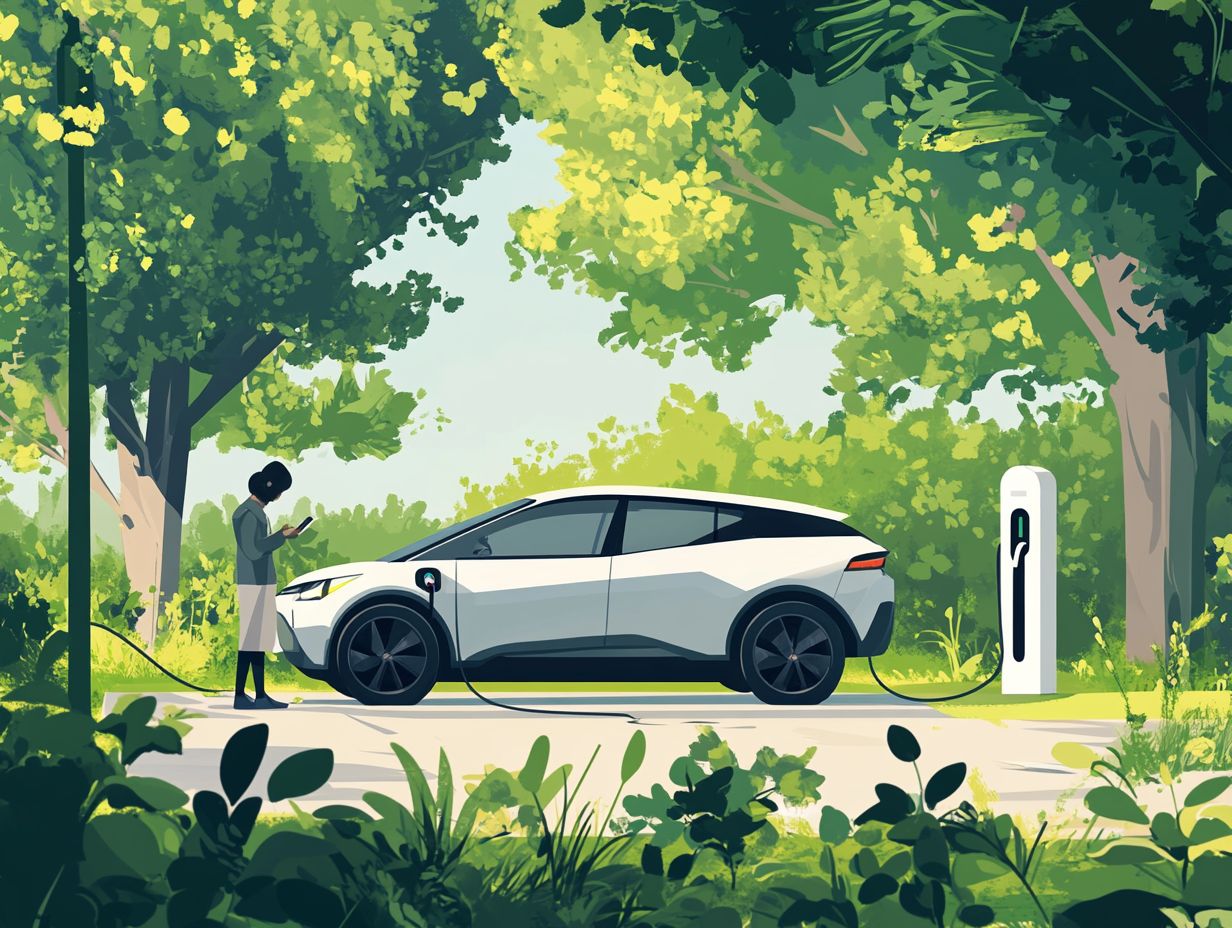
Knowing when to replace your electric vehicle’s battery is vital for maintaining optimal performance and understanding how to promote sustainability in EV usage can further enhance your efforts. For more details, check out 5 ways to promote sustainability in EV usage.
Key indicators include declining battery health, accelerated degradation, and a reduced range after several charging cycles.
For example, if your vehicle struggles to reach its maximum range or shows charging problems like taking longer to charge or failing to charge fully these could be unmistakable signs of a failing battery. Make it a habit to check your battery’s charge regularly and stay alert for any unusual alerts or dashboard warnings!
Implementing routine maintenance practices, such as monitoring the battery s temperature and ensuring proper ventilation, significantly enhances battery longevity. By keeping an eye on these symptoms, you’ll be well-equipped to make informed decisions about battery replacement, ensuring your vehicle delivers best performance for the long haul.
How Can You Extend the Lifespan of Your EV Battery?
Extending the lifespan of your electric vehicle’s battery is achievable through effective battery management, mindful charging habits, and adapting your driving style to reduce wear on the battery.
By implementing practical strategies such as adhering to optimal charging cycles and engaging in battery pre-conditioning, you can significantly enhance performance. For more tips on maintaining your charger, check out how to keep your EV charger maintained. Aim to charge the battery to around 80% rather than filling it to a full 100%; this helps maintain its health over time.
Incorporating regular maintenance practices, like ensuring proper tire pressure and avoiding sudden acceleration, further optimizes your vehicle’s efficiency. Familiarizing yourself with the best EV maintenance practices for families can also enhance your understanding of how driving conditions, like extreme temperatures and frequent short trips, affect battery performance, helping you make smarter choices that will prolong your battery’s life.
What Are the Environmental Benefits of Maintaining Your EV s Battery?
Maintaining your electric vehicle’s battery not only elevates its performance but also promotes environmental sustainability. By enhancing efficiency and extending the use of renewable energy, you can follow best practices for EV battery care, enabling battery recycling and second-life applications, which allows you to make a meaningful impact.
When you ensure your battery operates at optimal levels, you can reduce the need for replacements, which minimizes electronic waste that often ends up in landfills. Proper upkeep lets you store renewable energy more efficiently! It’s a win for both you and the planet!
Battery recycling is vital, enabling the reclamation and reuse of valuable materials, thereby lessening the environmental footprint of battery production. Embracing second-life applications for batteries such as energy storage solutions for homes and businesses not only extends their utility but also champions a circular economy, reinforcing your commitment to sustainability.
Frequently Asked Questions
What are the top 5 tips for maintaining your EV’s battery?
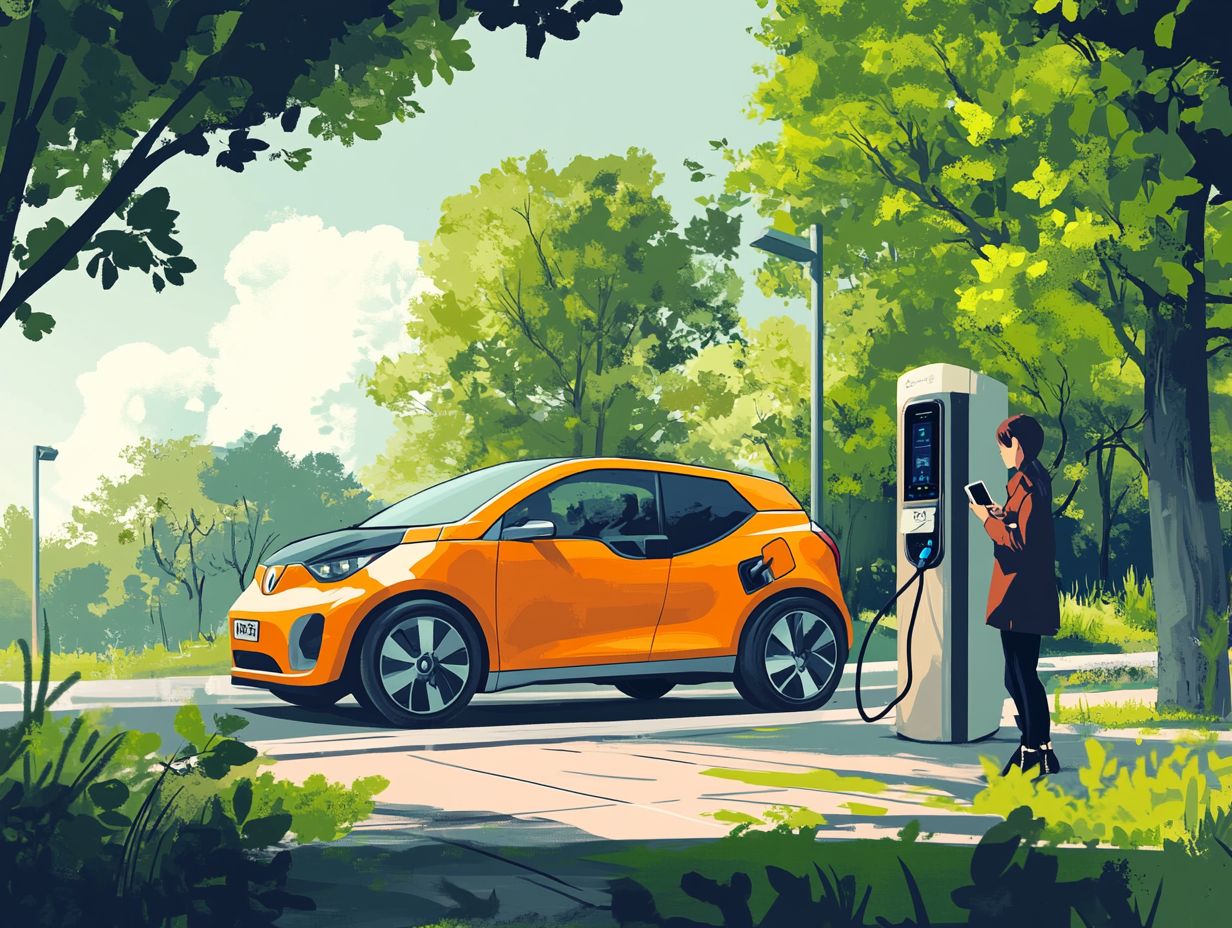
- Monitor and maintain proper charging levels: Avoid overcharging or draining your battery completely to ensure its longevity.
- Keep your battery cool: High temperatures can degrade battery performance, so park your EV in a shaded area.
- Use regenerative braking: This feature helps recharge your battery while driving, extending its range and lifespan.
- Plan your routes and charging stops: Efficiently planning trips and charging stops can reduce strain on your battery and help maintain its health.
- Schedule regular maintenance checks: Just like a traditional car, EVs require maintenance, so follow the recommended service schedule.
Why is it important to monitor and maintain proper charging levels for your EV’s battery?
Overcharging or draining your battery can shorten its lifespan. Keeping it charged properly is crucial.
How can I keep my EV’s battery cool to maintain its health?
Always park in the shade. High temperatures can harm your battery’s performance.
What is regenerative braking and how does it help maintain my EV’s battery?
Regenerative braking helps recharge your battery while you drive. This reduces strain and extends both range and lifespan.
Can planning my routes and charging stops help maintain my EV’s battery?
Absolutely! Planning your routes and charging stops wisely protects your battery. This will help keep it healthy.
Do EVs require regular maintenance checks like traditional cars?
Yes, EVs need regular maintenance too. Follow the service schedule for your model to keep it running smoothly.

